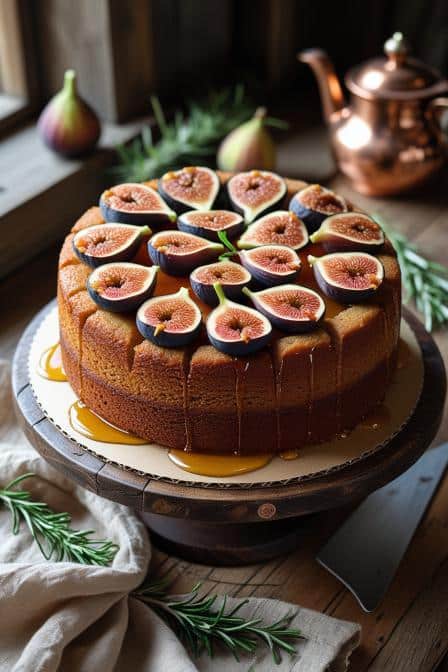There’s a moment, right before slicing into this cake, when the glossy roasted figs—bathed in honey, kissed by rosemary—almost make you hesitate. It looks too pretty to eat. Like a stained-glass mosaic sealed into warm caramel. Then you cut in, and the sticky-sweet topping melts down into a nutty, moist crumb that smells faintly of piney herbs and warm vanilla.
This ain’t your basic upside-down cake. It’s grown-up, rustic, and gorgeously seasonal. And it’ll have you looking at figs in a whole new way.
What Makes This Cake So Special?
This cake leans heavily into the contrast between sweet and savory. You get the deep, jammy richness of roasted fresh figs, the floral sweetness of good honey, and a subtle backbone of rosemary that grounds the whole thing.
The rosemary isn’t overpowering. It’s stealthy. A whisper in the background that plays beautifully with the figs’ syrupy depth. And when baked under a tender, golden cake batter infused with brown butter? Magic.
It’s ideal for late summer when figs are dripping off the trees and begging to be baked. Serve it warm with a spoonful of crème fraîche or Greek yogurt. Or chill it overnight—letting the honey seep even deeper into the crumb—for an elegant brunch showstopper.
Ingredients & Smart Substitutions
Here’s a look at what you’ll need—and how you can tweak things if needed.
| Ingredient | Purpose | Substitutions & Notes |
|---|---|---|
| Fresh figs (ripe but firm) | Star of the show | Mission, Adriatic, Brown Turkey—all work. Dried figs not ideal here. |
| Honey | Sweetens + glazes | Maple syrup or agave work, but honey adds unique flavor |
| Fresh rosemary | Herbal, earthy depth | Use dried (½ tsp), thyme, or skip for a simpler cake |
| Unsalted butter | Fat + flavor (browned for extra nuttiness) | Can use olive oil or vegan butter, but brown butter is best |
| Brown sugar | Caramel notes for the fig topping | White sugar works, but lacks molasses richness |
| Eggs | Binds and adds richness | Room temperature is key |
| Whole milk | Moisture + tenderness | Almond milk or buttermilk work too |
| All-purpose flour | Structure | A 50/50 mix of AP + almond flour adds nice texture |
| Baking powder + soda | Leavening | Use both for balanced rise and tender crumb |
| Salt | Balances sweetness | Don’t skip it |
| Vanilla extract | Flavor roundness | Almond extract could be a fun twist |
| Lemon zest | Brightens and lifts flavors | Optional—but adds a lovely spark |
Step-by-Step Instructions (With Chef’s Tips)
1. Prep the Figs and Pan
Butter and line a 9-inch cake pan with parchment. Don’t skip the parchment—this cake gets sticky.
Trim the stems off your figs and slice them in half lengthwise. Arrange them cut-side down in concentric circles in the pan.
Drizzle with honey (a generous ¼ cup) and scatter some finely chopped rosemary. This becomes the glossy, caramelized top once flipped.
💡Chef’s Tip: Slightly underripe figs hold their shape best during baking. Super ripe ones get mushy.
2. Brown the Butter (Don’t Skip This)
In a small saucepan, melt ½ cup butter over medium heat. Let it foam, sizzle, and then turn golden with brown specks at the bottom. It’ll smell nutty and almost toffee-like.
Remove from heat and let cool slightly. You’ll use this in the batter for rich, deep flavor.
💡Chef’s Tip: Brown butter gives the cake a warm, caramel note that pairs insanely well with figs and honey.
3. Mix the Dry Ingredients
In a bowl, whisk together:
- 1¼ cups all-purpose flour
- ½ tsp baking soda
- 1 tsp baking powder
- ½ tsp salt
Set aside.
4. Mix the Wet Ingredients
In a large mixing bowl, combine:
- ¾ cup brown sugar
- The cooled brown butter
- 2 large eggs
- 1 tsp vanilla extract
- Zest of 1 lemon
Whisk until smooth and glossy.
Add ½ cup milk and stir to combine.
5. Bring It All Together
Gently stir the dry ingredients into the wet, mixing just until no dry streaks remain. Don’t overmix.
Pour the batter over your fig layer and smooth it out with a spatula.
6. Bake
Bake at 350°F (175°C) for 35–40 minutes, or until the top is golden and a toothpick comes out clean.
Cool for 15 minutes, then carefully invert onto a plate or cake stand. Peel off the parchment and admire that sticky fig crown.
💡Chef’s Tip: If any figs stick to the pan, just gently nudge them back into place. No one’ll notice once the glaze sets.
The Science & Tools Behind the Cake
Why Brown Butter?
Brown butter enhances complexity. It has milk solids that toast during heating, giving you a nutty aroma and rich flavor that basic melted butter can’t replicate. Perfect with honey and figs.
Why Both Baking Soda and Baking Powder?
Baking soda reacts with the acid in lemon zest and brown sugar. Baking powder adds extra lift. The combo gives you a light, tender crumb without being too airy.
Why Parchment Paper?
Sticky honey and fig juices will absolutely glue your cake to the pan without it. Greasing alone ain’t enough.
Storage & Reheating
- Room temp: Covered, it’ll last 2 days (it gets better overnight).
- Fridge: Keeps for 4–5 days. Let it come to room temp or reheat gently.
- Freezer: Wrap slices tightly. Thaw and warm in a low oven.
💡Serving from the fridge? A quick zap in the microwave wakes up the fig syrup and makes the cake melt-in-your-mouth soft again.
Recommended Tools
- 9-inch round cake pan (2-inch deep)
- Parchment paper
- Offset spatula
- Saucepan (for browning butter)
- Whisk + mixing bowls
Serving & Pairing Suggestions
This cake is versatile. Serve it:
- Warm with crème fraîche, vanilla ice cream, or whipped mascarpone
- Chilled with Greek yogurt and extra drizzle of honey
- As a brunch centerpiece, paired with strong black coffee
- As a rustic dessert after roast chicken, grilled lamb, or charcuterie
Drink Pairings
- Honeyed white wines like Sauternes or late harvest Riesling
- Earl Grey tea (the bergamot plays nicely with rosemary)
- A splash of Amaro for an herby digestif
Best Time to Serve This Cake?
Late summer into early fall is prime fig season, so now’s the time. It’s perfect for:
- Alfresco dinners
- Elegant brunches
- Rosh Hashanah or holiday tables
- Weekend baking therapy
Let it be the star. It doesn’t need frosting, layers, or fanfare. It’s humble… but hits all the right notes.
Final Thoughts: Tips for Success
- Use ripe but firm figs—you want them to roast, not melt.
- Don’t skip the brown butter—it deepens flavor like nothing else.
- Be generous with the honey, but not so much that it pools.
- Let it cool 15 mins before flipping. Any earlier, and it may fall apart.
- Eat it within two days—or freeze slices to enjoy later.
This cake’s got soul. It’s the kind of bake that feels rustic and elegant all at once. And once you’ve had fig cake with rosemary and honey, plain upside-down cakes just won’t do.
FAQs
Can I use dried figs?
Not recommended. Dried figs won’t soften enough and won’t create the juicy, caramelized topping we want. Stick to fresh.
Can I make this gluten-free?
Yes—try a 1:1 gluten-free flour blend, or a combo of almond flour and gluten-free AP flour for a nutty vibe.
What if I don’t have fresh rosemary?
Use ½ tsp dried rosemary or swap in thyme, lavender, or skip it altogether if you prefer a sweeter finish.
Can I use a cast iron skillet instead of a cake pan?
Yep! Just make sure it’s well-seasoned and lined to prevent sticking. Cast iron gives a beautiful crust.
Can I make it ahead?
Totally. Bake it the night before, store at room temp, and flip right before serving. The flavors deepen overnight.
Let me know if you want a mini version of this for Pinterest or an image prompt to match.

